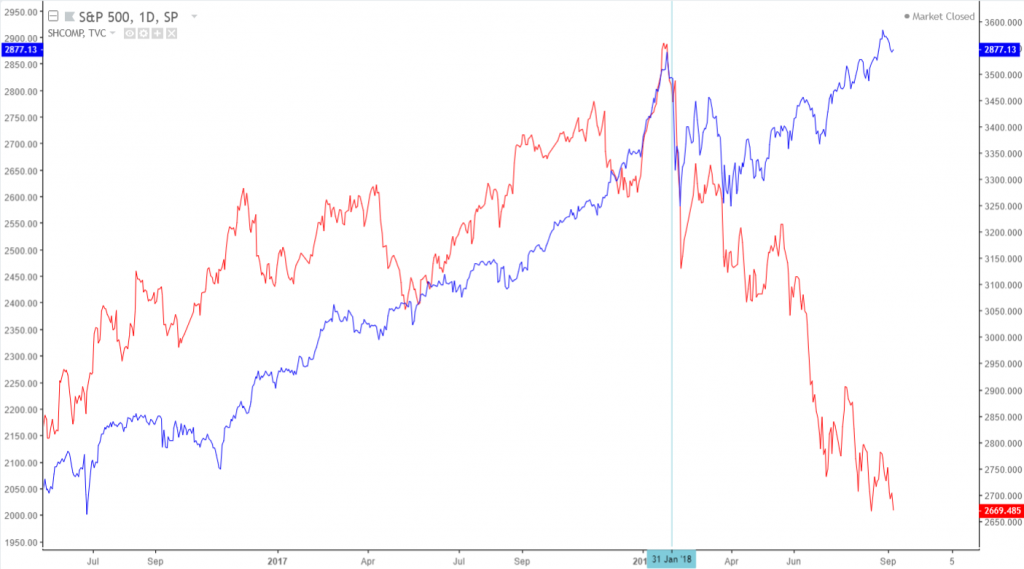In March of this year, Donald Trump tweeted that “trade wars are good, and easy to win”.[1] After the first round of sanctions one could come to the conclusion that he was indeed right. As the chart below shows, the S&P 500 (blue) has found its way up again. For the Shanghai Composite (red), however, the February correction turned out to be the beginning of a true ‘bear market’. Furthermore, the Chinese Yuan has fallen sharply against the US dollar and Chinese products therefore have become cheaper for Americans; something that Trump will be less pleased about, as his main goal is to reduce the US trade deficit with China.
Due to the large trade deficit with China, the US can levy import tariffs on a larger quantity of goods than China. The Chinese must therefore come up with other ways to strike back. Last Thursday, China announced that it plans to reduce import tariffs on products from other trading partners per October in order to further weaken the competitive position of American products.[2] A smart move, as it is a sign of China’s willingness to open its markets to free trade, while simultaneously harming US exporters.
China still holds two major trump cards in case the trade war continues to escalate: it can choose to devalue the Yuan and it can start dumping US government bonds. These retaliatory measures are called China’s ‘nuclear options’ because both the US and China would suffer greatly. To what extent is it realistic that China will make use of these retaliatory measures?
The devaluation of the Yuan would lead to a lower exchange rate and as a result China would be able to increase its exports. Consequently, the effects of the American import tariffs would be (partially) mitigated. A major disadvantage of a devaluation is that it often goes hand in hand with capital flight and a decline in confidence in a country’s financial system. It is estimated that the combined debt to GDP ratio of the Chinese government, Chinese companies and Chinese individuals currently stands at 266%, which is a huge increase since 2008 when the ratio was 162%. Unleashing a financial crisis is therefore the last thing the Chinese government currently wants. Additionally, a devaluation would most likely anger China’s other trading partners because it would hurt their competitiveness.
Another way China could hurt the US is by dumping its vast holdings of US government bonds. Over the years, China has amassed a $ 1.2 trillion (that’s $ 1,200 billion) portfolio of US treasuries due to its structural trading surplus with the US, its abundance of dollars and the desire to not let the Yuan appreciate too much against the dollar. According to some, a large-scale dump would cause the dollar to fall, US interest rates to rise and it could possibly even lead to a crash of the US stock market. However, it is unlikely that China will actually proceed to dump US government bonds, as China would incur large losses due to the falling bond prices and because the appreciated Yuan would lead to a drop of Chinese exports to the US, causing bankruptcies and unemployment in China. Next to that, it is not inconceivable that the US would freeze China’s treasuries even before the selling could actually start. The possibility of China dumping treasuries therefore seems far-fetched.
In light of recent developments, it seems the trade war is far from over. It remains uncertain which measures China is going to implement in the future in order to counter Trump, should he again announce sanctions. Time will therefore have to tell if trade wars are indeed easy to win or not. One thing is certain however: Chinese stocks are on sale right now!
[1] https://twitter.com/realDonaldTrump/status/969525362580484098?ref_src=twsrc%5Etfw%7Ctwcamp%5Etweetembed%7Ctwterm%5E969525362580484098%7Ctwgr%5E373939313b636f6e74726f6c&ref_url=https%3A%2F%2Fwww.cnbc.com%2F2018%2F03%2F02%2Ftrump-trade-wars-are-good-and-easy-to-win.html
[2] https://www.reuters.com/article/us-usa-trade-china-tariffs/china-plans-import-tariff-cuts-as-soon-as-october-bloomberg-idUSKCN1M00MU


















